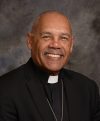“Where is the child who has been born king of the Jews? For we observed his star at its rising, and have come to pay him homage” (Matthew 2:2).
Epiphany is one of my favorite church festivals. It evokes an assorted set of memories.
The first one goes all the way back to infancy. As a child in Puerto Rico, Epiphany was our Christmas. We called it Three Kings Day or El día de los reyes. On the fifth of January, the eve of Epiphany, we children would take a shoe box, fill it with grass and place it under our beds. This was ostensibly food for the camels, somewhat like leaving milk and cookies for Santa. When we awoke, the box would be empty of grass, but somewhere in the vicinity under our beds, there would be toys or whatever gifts the “three reyes magos” (three wise men) brought us. All day throughout the neighborhood the burning question on everyone’s lips would be, “Qué te trajeron los reyes?” (“What did the wise men [or kings] bring you?”)
It was not until we moved to the mainland United States that we learned of the custom of receiving gifts at Christmas. Our thought on the island was, since the wise men brought gifts to the Christ child on Epiphany, it stood to reason that this day should be the day of giving gifts.
But my most bittersweet recollection took place as a junior in college when I was blessed and beleaguered to be in the right place at the right time. I sang bass in the college choir, and the drama department needed voices to perform in their production of Gian Carlo Menotti’s Christmas classic, “Amahl and the Night Visitors.” The script called for the one king, Balthazar, the bass, to be played by a black man. I happened to fit all the demographic requirements but I was not the director’s first choice. The original person cast in the role was white and the plan was to paint him with dark brown makeup. When some of the African American choir members learned of this, they were insulted, to say the least, and they made their feelings known. The controversy spread to the rest of the few minority students on campus who requested a meeting with both the drama and choir directors. The result was that I was cast in the role. The acrimony that stemmed from the incident was soon forgotten, but the results could have been disastrous had I not performed well.
I don’t know whether anyone was transformed or any attitudes were changed as a result of that encounter. But the story of the wise men from the East is transformational in its message. If you’ve read the narrative, which, incidentally, only appears in the Gospel of Matthew (2:1-12), you know that wise men from the East came to pay homage to the child who was born king of the Jews. Among the messages one gathers from the story is that God’s love and salvation is available to all people, not just a select few. The wise men were Gentiles, not Jews. One can assume they were into astrology, which might explain how they received the news of Jesus’ birth by way of the star that was visible to them.
The good news of the gospel reaches out to us in different ways. The star in the east, which drew the wise men to Jesus, and the angels who announced the birth to the shepherds are all indications that there is no one way to reach out to those who need to hear the message. There is no one style of worship that is better suited or more effective in attracting people to Jesus. I am often reminded of this when I attend worship services of other traditions or hear a debate about liturgical versus contemporary worship. We can sometimes get bogged down in details and forget the big picture. It’s not about how we worship but how that worship speaks to us and how we respond. The lives of the wise men were changed forever as a result of coming face to face with Jesus. We are called to be that light of a star to others who may also need to come face to face with our risen Savior. As Jesus tells us in Matthew 5:16: “In the same way, let your light shine before others, so that they may see your good works and give glory to your Father in heaven.”
Originally posted Jan. 3, 2013, at Pastor Allende’s Blog. Republished with permission of the author. Find a link to Abraham Allende’s blog, Pastor Allende’s Blog, at Lutheran Blogs.




